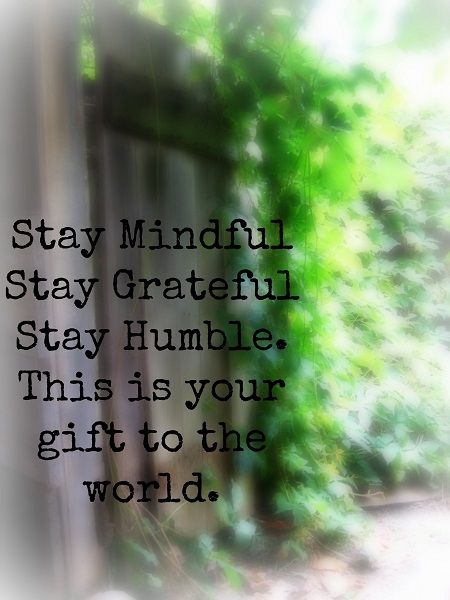“Mindfulness is First World Bullshit.”
So said a Reiki client of mine, climbing off the massage table and reaching for the bowl of seeds and nuts I had set out for him.
Huh?
I am used to all kinds of reactions after Reiki sessions. But mostly I expect that kind of bliss-ed out, spacey look until I’ve fed and watered them. Not much talking happens straight away. But this client had words to spare. And thus ensued a barter of ideas while we sat and decompressed.
“Why do you say that?” I asked.
“Look around you.” I did. “What do you see?”
“Mmm. A room with a fire, a cozy space, nature outside the window…you eating seeds like a squirrel…” I laughed. He was eating voraciously, mind churning. “You’re supposed to be relaxed…I must be losing my touch.”
“Seriously. I was thinking while you were getting my food…thanks, by the way…we’re just a bunch of spoiled, first world brats, we have everything we want.” He waved his arms around the room to show me all I had.
Personally, I don’t think that I have everything I want. I need a new kitchen with a larger pantry and a gas stove.
But I said nothing, and nodded.
He continued. “We know nothing of hardship and we arrogantly spout off about living more spiritual lives and being mindful of others, yada, yada. But it’s all first world bullshit. People who are struggling don’t talk about mindfulness; they just go about their business being mindful, because they understand struggle. You know, being kind to their neighbor, sharing what meager amounts of food they have, working in community, with the unspoken hope that if they are in need, a helping hand will be there. People who have less seem to have more to give than us Westerners who have much and give proportionately little. Mindful should be our state of being, not this cultish thing we do to make the world better, or to add meaning to our lives.
“You don’t think we should do mindful things then? Westerners can’t be blamed for the circumstances they’ve been born to. Should we add suffering to our list of things to do? Although we do suffer a lot from our thoughts in this culture.”
I added more wood to the fire and was suddenly and poignantly aware of how easy it had been for me to acquire two bush cords of wood. I hadn’t had to scour the forest looking it, hoping there would be enough for me and the rest of my village. I needed a cup of tea, and of course, my cupboard was full of teas—thirteen kinds to be exact.
“I do think we need to be mindful, of course, but not to “change the world” as we so often arrogantly say. The greatest people in history didn’t go around doing Ted Talks about how to change the world; they just lived mindfully by default. There was no other way to be, they had no great ideas of shifting societies, nor did they talk about their “vision.” It was a day by day walk where their souls, defined by the hardships they had seen or experienced, could do nothing but live a spontaneously mindful life. But we have to imagine hardship. We have to manufacture a mindful life out of our excess. First we fuck up the planet, rape and pillage it, then we freak out and start screaming “mindful” like a bunch of lunatics. God, we’re all suffering from First World insanity.”
“Wait, I need tea and something to write on.”
“You going to write about this for your elephant?”
“Yeah.” I smiled. “My elephant.” Where I wrote about mindfulness. Where countless others communicated words about mindfulness. The irony of what a deep privilege my freedom of speech is was not lost on me.
This man had me thinking. Deep.
But I had been hungry once, had experienced long line ups for food in a communist country, had gone home with nothing because by the time my grandmother and I reached the counter there was nothing left, and we hadn’t any American dollars for the stuff on the top shelves. I’ve broken down at my first site of a grocery store full of food when I arrived in Canada. I’d lived in a one room apartment half the size of my present kitchen.
What became of those memories?
1. A passion for local food, and farmer’s markets. The village square, packed full of farmers and jostling housewives was the place where one could count on a decent basketful of purchases.
2. A need to foster community, in whatever way I found possible.
3. A drive to remember that all I had was an illusion. All I truly “had” was this one moment of time to live my kindest, most grateful life. Everything else was meaningless in the grand scheme of things.
“So, what’s your suggestion, then? How to live mindfully as citizens of the First World?”
“I think we have to begin with our attitude. Being grateful, humble. Yes!”
He jumped and so did I. “Humility” That is what I lack. I’ve replaced it with smugness. It’s become part of my ego, all my mindful living. I think that what I’m talking about is intention. Keeping it pure.
Mindfulness for mindfulness sake.
“Like Gandhi said, change yourself, change the world?”
“Yes, exactly. Forget about being the hero, changing the world…just work on yourself. The rest will come. Start here.” My client pointed at his heart. His eyes watered. “That’s what I’ve taken from today’s treatment. I need to work on myself.”
“Have we been talking about you all this time?”
“Yes.” Now he cried openly.
“Shall we meditate?”
“Yes. I need to go in.” We closed our eyes, and started with OM.
A few words from one of my favorite teachers, Eckhart Tolle, about being the change and what we are responsible for.
Relephant:
The Difference Between New-Age Spirituality & Authentic Spirituality in 3 Paragraphs.
Author: Monika Carless
Editor: Renée Picard
Photo: courtesy of the author
Facebook is in talks with major corporate media about pulling their content into FB, leaving other sites to wither or pay up if we want to connect with you, our readers. Want to stay connected before the curtain drops? Sign up for our curated, quality newsletters below.



Read 12 comments and reply